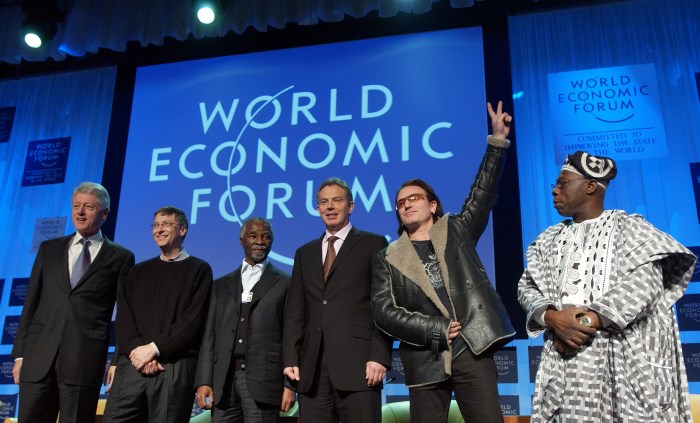Michael Roberts looks at the Great Davos Neo-Liberalism Show and what is on offer – and what this has to do with reality.
Michael Roberts – Economist in the City of London and prolific blogger
Cross-posted from Michael Roberts Blog

This year’s World Economic Forum starts in Davos, Switzerland today. Two years ago, Chinese President Xi made the keynote speech, in which he argued for more trade and investment globally as opposed to the newly-elected US President Donald Trump’s threats to impose tariffs to protect (supposedly) American workers. Then last year, Trump himself turned up to tell the audience of corporate chiefs, finance and hi-tech social media moguls, as well as other government leaders, that ‘America First’ would continue and that the trade war with China would hot up.
This year, such is the political disruption in all the major economies that neither Trump (because of government shutdown squabble over building the ‘wall’) nor Xi will be in Davos; nor will French President Macron (with his giles jeunes protests to deal with), nor the UK’s Theresa May (with the Brexit debacle to cope with). Only the Japanese PM Abe and ‘lame duck’ German Chancellor Merkel will be there.
Davos is the debating hub of the leaders and supporters of global capital and globalisation (free movement of multinational capital and trade without national restrictions). Globalisation is part of the neoliberal project to maximise profits, although this aim is cloaked in the respectable mainstream economics view that it will bring growth and incomes to all.
The Davos elite see that this propaganda has been exposed by the evidence of global poverty and inequality. So the Davos organisers want to focus on reversing the further decline of ‘globalisation’ ie free trade and movement of capital (and labour?) in the face of sluggish, depressed growth since the Great Recession and the rise of ‘populism’ in the government of Italy, Hungary and Poland in Europe, Trump in the US and Bolsonaro in Brazil (he is there today).
Yet, as the rich and the great meet to discuss the world, the IMF has released its latest forecast for world real GDP growth and it has lowered its forecast for the second time in three months. It now expects the global economy to expand by 3.5% in 2019, less than in 2018. This would be the lowest rate since 2016. It appears that the optimistic hopes of a return to pre-Great Recession rates of growth in trade and output have been dashed again. The Long Depression of low growth, low trade, low investment and, above all (for labour) low real income growth, will continue into an 11th year. “The global expansion is weakening and at a rate that is somewhat faster than expected.” The IMF still reckons growth will pick up to 3.6% in 2020, but the risks nevertheless “tilt to the downside”.
The IMF report came in the same week as news that China’s real GDP growth in the 4th quarter of 2018 had slowed to just 6.4% yoy, the slowest rate since the Great Recession. Of course, this rate of growth is still way higher than any of the top G7 capitalist economies, which can only muster growth between zero (Italy) and 2.5% (US). Earlier this month, Europe’s powerhouse economy, Germany, recorded that 2018 delivered the weakest growth rate in five years. And China’s growth rate is still higher than any other G20 economy except India (and the GDP measure there is even more dubious than mainstream economists reckon China’s is).
Global trade growth in the era of globalisation from the mid-1980s onwards grew faster than global GDP by an average ratio of around 2 to 1. And financial assets rocketed. But since the Great Recession, trade growth has barely matched a lower world GDP growth rate and global financial assets have stagnated relative to world GDP.
The Davos team are desperately hyping the cause of globalisation in their reports. “Globalization is alive and well. An effective and resilient international order, comprising strong nation-states, thus remains essential”, they tell us. The challenges to globalisation remain: rising inequality, the damage of climate change, the loss of jobs from digital technology and end of the hegemonic role of the US in the world. But Davos still hopes for a new wave of globalisation to preserve the “current liberal order” and restore optimism on “global unity” by making “economic inclusion and equity a priority”.
A supporter of the ‘liberal order”, Martin Wolf of the Financial Times once wrote a book called Why globalisation works. That was in 2004. Since the Great Recession and the Long Depression, he has had to eat his words and recognise that “The elites – the policymaking business and financial elites – are increasingly disliked”. So “you need to make policy which brings people to think again that their societies are run in a decent and civilised way.”
Yet only this week, he posted his hopes that ‘globalisation’ would be revived through the ‘globotics’, the integration of robots with AI. “This will promote globalisation” as “many tasks now carried out by people will be done by AI and robots, revolutionising many service activities, with profound and highly destabilising economic and social effects.” This hardly sounds like a trend that will bring global unity and preserve the liberal order, but, according to Wolf, “discovering new ways of annihilating distance and jumping barriers” means that “in the long run”, the liberal order “will probably win” and globalisation proceed, even if “the short run looks very bumpy”. Hmm.






Be the first to comment